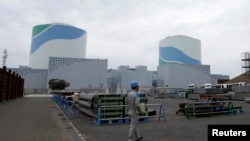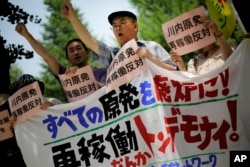Japan’s nuclear regulator said two reactors at a nuclear power plant shut down in the wake of the Fukushima nuclear plant meltdown three years ago are safe enough to switch back on.
Japan's Nuclear Regulation Authority approved safety upgrades at Kyushu Electric Power's Sendai power plant, located on the southern tip of Japan's Kyushu island.
The plant would become the first of Japan's nuclear plants to restart under stricter standards.
Regulators said the plant is now capable of avoiding severe meltdowns like that of the Fukushima plant following an earthquake and tsunami in 2011.
But final approval to put the Sendai plant back into operation, if granted, would come only after a 30-day public comment period ending in mid-August.
Some Japanese opposed to nuclear power said the country is a volcanic island, making it unsafe for nuclear power.
But Nuclear Regulation Authority Commissioner Yasuhiko Shimazaki said Wednesday that the danger is minimal.
"Judging from the assessment submitted by the operator, we have come to a conclusion that the possibility of a Vesuvian eruption in the area is very unlikely," Shimazaki said.
Japan switched off its nuclear reactors for maintenance after the Fukushima accident, which crippled the plant and exposed the surrounding area to radiation.
Since then, Japanese citizens have faced higher energy prices as the nation switched its energy use to fossil fuels. The change also caused trade deficits with Japan's energy partners.
But opposition to nuclear energy in Japan remains strong, with repeated protests staged in front of the office of Prime Minister Shinzo Abe, who has pushed to get Japan's nuclear plants running again.






